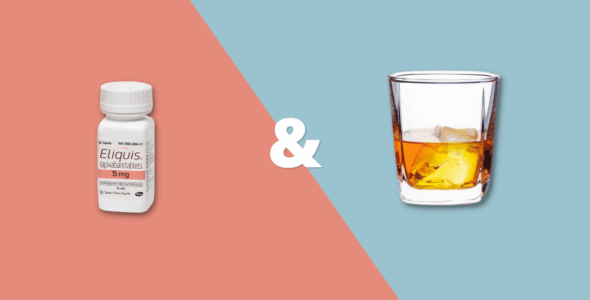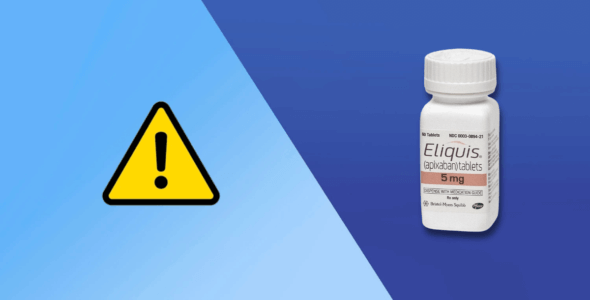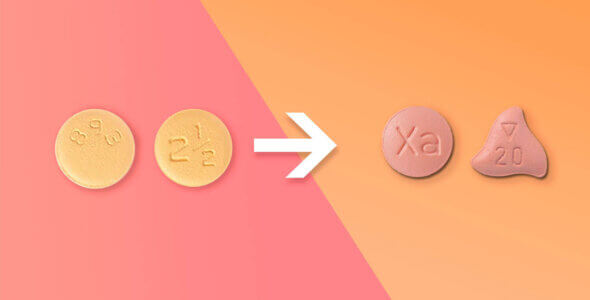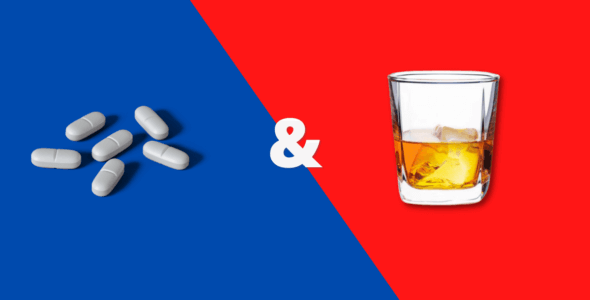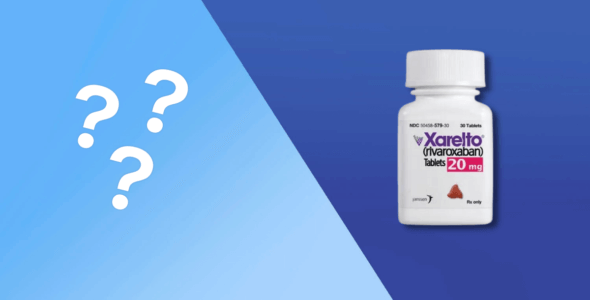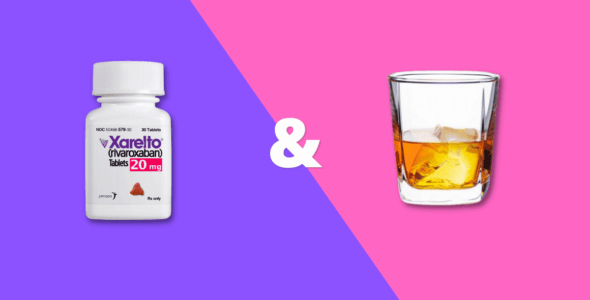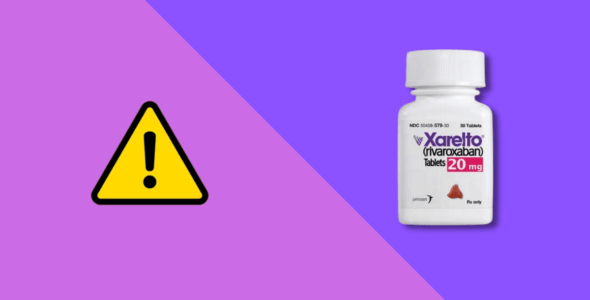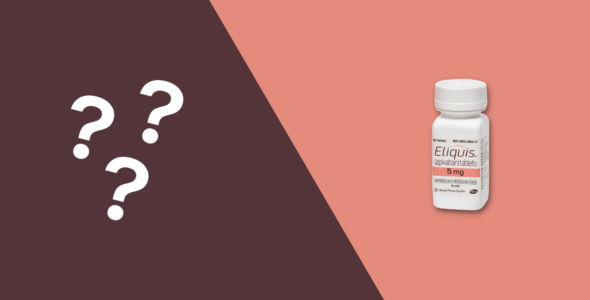Eliquis and Xarelto are brand names for blood thinners used to prevent blood clots. Both are prescription drugs approved by the FDA. These drugs were developed as an alternative to warfarin to reduce the need for regular blood tests. Both drugs are direct oral anticoagulants (DOAC) classed as factor Xa inhibitors.
Other factor Xa inhibitors are Pradaxa (dabigatran), Arixtra (fondaparinux), and Savaysa (edoxaban)
Are Eliquis and Xarelto the same? Which one should you take? Your doctor will be able to prescribe the best possible medication for your condition but it is important to know the differences between them. To help, here we explain clearly and simply what Eliquis and Xarelto are, how they work, the similarities and differences between them and their side effects, and more. This should provide you with the basics to better understand your options.
What is Eliquis?
Eliquis contains the active ingredient apixaban. It is a direct oral anticoagulant that works by blocking factor Xa. Factor Xa produces thrombin, a fundamental component in the clotting process. By blocking factor Xa, Eliquis can reduce the production of clots.
Eliquis is available in two strengths: 2.5 mg and 5 mg. Dosage varies by indication. Eliquis is manufactured by Bristol-Myers Squibb.
What is Xarelto?
Xarelto contains the active ingredient rivaroxaban. Like Eliquis it is a direct oral anticoagulant and works by blocking factor Xa in the blood clotting process.
It comes in tablet form and is taken by mouth. Xarelto is available in four strengths: 2.5 mg, 10 mg, 15 mg, and 20 mg. Dosage varies by indication. Xarelto is manufactured by Janssen Pharmaceuticals.
What conditions are treated with Eliquis?
Eliquis is indicated for the following conditions:
- Reduce the risk of stroke and systemic embolism in patients with nonvalvular atrial fibrillation (AFib, or irregular heartbeat known as an arrhythmia)
- Prevent deep vein thrombosis (DVT) in the legs and pulmonary embolism (PE) in the lungs of patients who have had hip or knee replacement surgery
- Treatment of deep vein thrombosis (DVT) in the legs
- Treatment of pulmonary embolism (PE) in the lungs
- Reduce the risk of recurrent DVT and PE
What conditions are treated with Xarelto?
Xarelto is indicated for the following conditions:
- Reduce the risk of stroke and systemic embolism in patients with nonvalvular atrial fibrillation (AFib, or irregular heartbeat)
- Prevent deep vein thrombosis (DVT) in the legs and pulmonary embolism (PE) in the lungs of patients who have had hip or knee replacement surgery
- Treatment of deep vein thrombosis (DVT)
- Treatment of pulmonary embolism (PE)
- Reduce the risk of blood clots happening again in people who continue to be at risk for DVT or PE after receiving treatment for blood clots for at least 6 months
- Prevention of DVT, which may lead to PE in patients undergoing knee or hip replacement surgery
- Prevention of blood clots in certain people hospitalized for an acute illness and after discharge, who are at risk of getting blood clots due to the loss of or reduced ability to move around, and other risks for getting blood clots, and who do not have a high risk of bleeding
Xarelto can also be used with aspirin to:
- Lower the risk of dangerous cardiovascular events such as death, heart attack, and stroke in patients with chronic coronary artery disease (CAD) or peripheral artery disease (PAD)
- Reduce the risk of a serious reduction in blood flow to the legs, stroke, major amputation, and heart problems in patients with PAD (peripheral artery disease, a condition where the blood flow to the legs is reduced)
Is Eliquis or Xarelto more effective?
The results from multiple clinical trials have shown Eliquis and Xarelto are equally effective for treating acute venous thromboembolism (VTE) but Eliquis may be safer. Both major bleeding and minor bleeding events were higher in the Xarelto group of patients.
Eliquis, Xarelto, Pradaxa, and Coumadin (warfarin) were reviewed in another study finding that Eliquis ranked best in terms of efficacy, safety, and patient compliance.
Your healthcare provider can provide you with the best information on which drug will suit you best. They can take into account your full medical history plus other medications you take that could interact with Eliquis or Xarelto.
What are the possible side effects of Eliquis and Xarelto?
The most common side effects of both drugs are related to bleeding, such as nosebleeds, or bleeding gums. The increased risk of bleeding problems may on occasion turn into major bleeding, causing life-threatening results.
Other side effects that may occur with Eliquis include fatigue, weakness, breathlessness, and nausea.
Other side effects that may occur with Xarelto include back pain, fatigue, dizziness, itching, anxiety, depression, and insomnia.
This is not a complete list of side effects. Consult your healthcare provider for more information on the adverse reactions of Eliquis and Xarelto.
Drug interactions with Eliquis & Xarelto
Eliquis and Xarelto interact with certain drugs that are metabolized by the same enzyme. When enzyme inhibitor drugs such as ketoconazole (Nizoral), itraconazole (Sporanox), and ritonavir (Norvir) are used with Eliquis or Xarelto, the levels of Eliquis or Xarelto in your body will increase. This will put you at increased risk for bleeding. To avoid this it is likely that your doctor will decrease your dose of Eliquis or Xarelto while on both medications.
By comparison, when enzyme inducers such as carbamazepine (Carbatrol), phenytoin (Dilantin), rifampin are taken with Eliquis or Xarelto, Eliquis and Xarelto are metabolized at a faster rate, therefore the levels of Eliquis or Xarelto available to your body are reduced.
Using Eliquis or Xarelto with drugs such as enoxaparin (Lovenox), warfarin (Coumadin or Jantoven), heparin, aspirin, clopidogrel (Plavix), and chronic NSAIDs (nonsteroidal anti-inflammatory drugs, Neoprofen and Naprosyn) may increase the risk of bleeding.
This is not a complete list of drug interactions of Eliquis and Xarelto. Consult your healthcare provider for more information.
Warnings of Eliquis and Xarelto
If you have kidney problems, both Eliquis and Pradaxa would require dose adjustments. Eliquis or Xarelto are not recommended in patients with prosthetic heart valves and should not be used in patients with triple-positive antiphospholipid syndrome (APS) due to an increased risk of clotting.
This is not a complete list of warnings of Eliquis and Xarelto. Consult your healthcare provider for more detailed information.
Can you use Eliquis or Xarelto while pregnant?
Eliquis and Xarelto are generally not used in pregnancy. There is limited data available. Consult your healthcare provider as some exceptions may occur in certain patients who are at high risk for clots.
Why are there so many dosage regimes for Xarelto?
It depends on the condition you are taking the drug for. You must always take the dose your doctor prescribes for you. Here are commonly used dosages for some of Xarelto’s indications:
- Reducing the risk of stroke in people with AFib not caused by a heart valve problem – 20mg daily in the evening with food
- Preventing DVT after hip replacement – 10mg daily with or without food for 35 days
- Preventing DVT after knee replacement – 10mg daily with or without food for 12 days
- Treatment of DVT and PE – 15mg twice daily with food same time each day, after 21 days 20mg daily
- Reduce cardiovascular risk in people with CAD or PAD – 2.5mg twice daily with or without food plus aspirin
Can you take Xarelto or Eliquis with herbal supplements?
St John’s wort and turmeric are the most common herbal supplements that can make Xarelto and Eliquis work less effectively. Medical advice is against taking them with these drugs.
Can you take Vitamin K with Xarelto and Eliquis?
Xarelto and Eliquis are new oral anticoagulants that are not affected by vitamin K. There are no dietary restrictions unlike Coumadin (warfarin).

